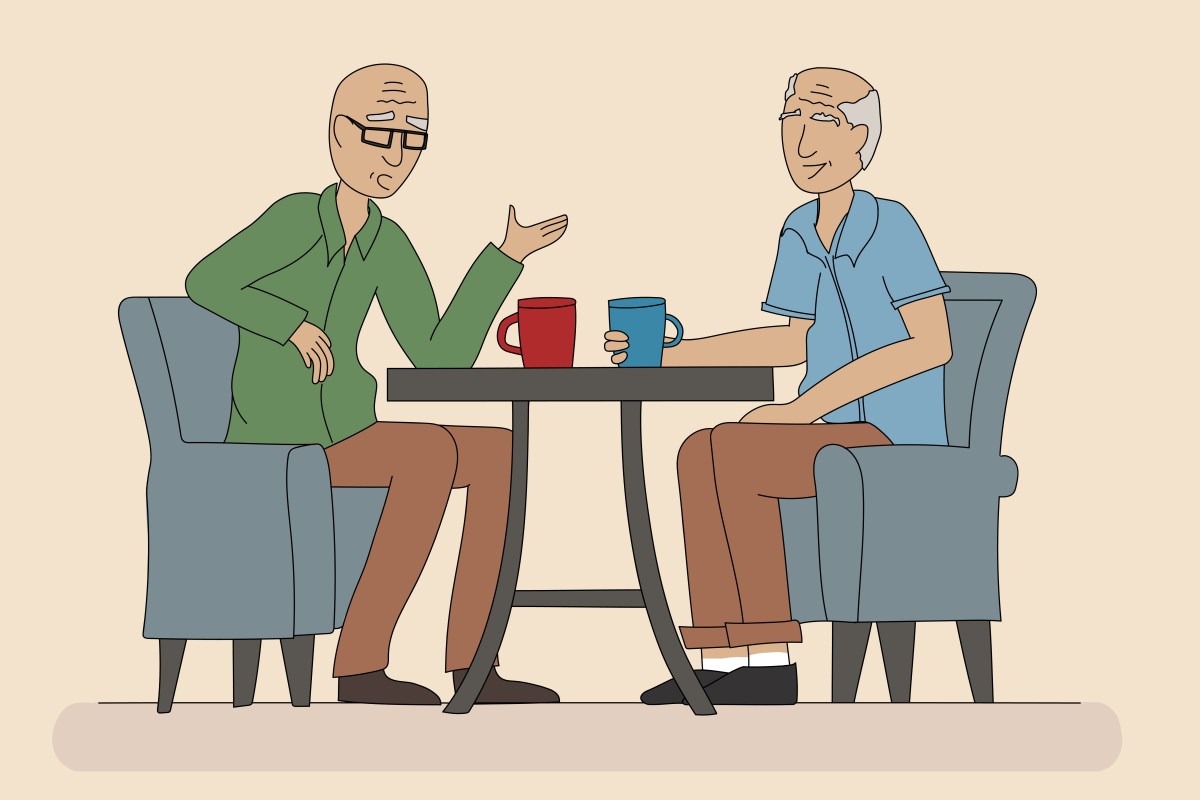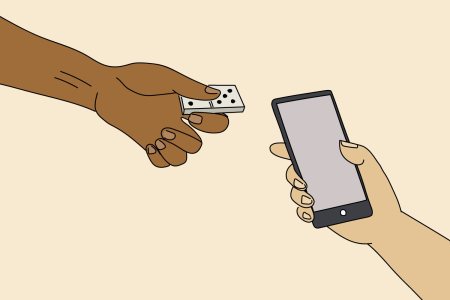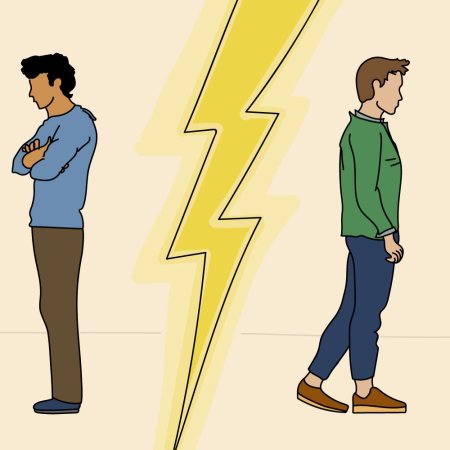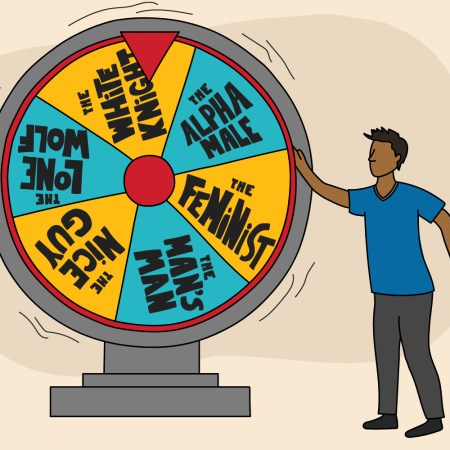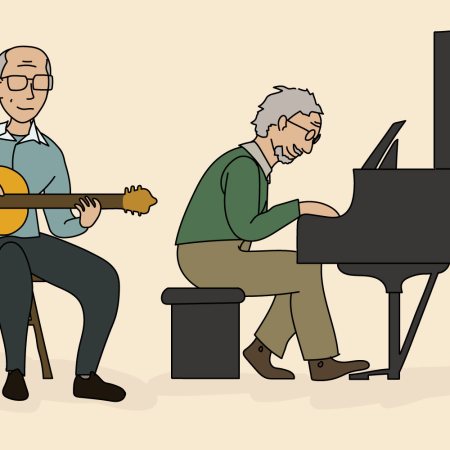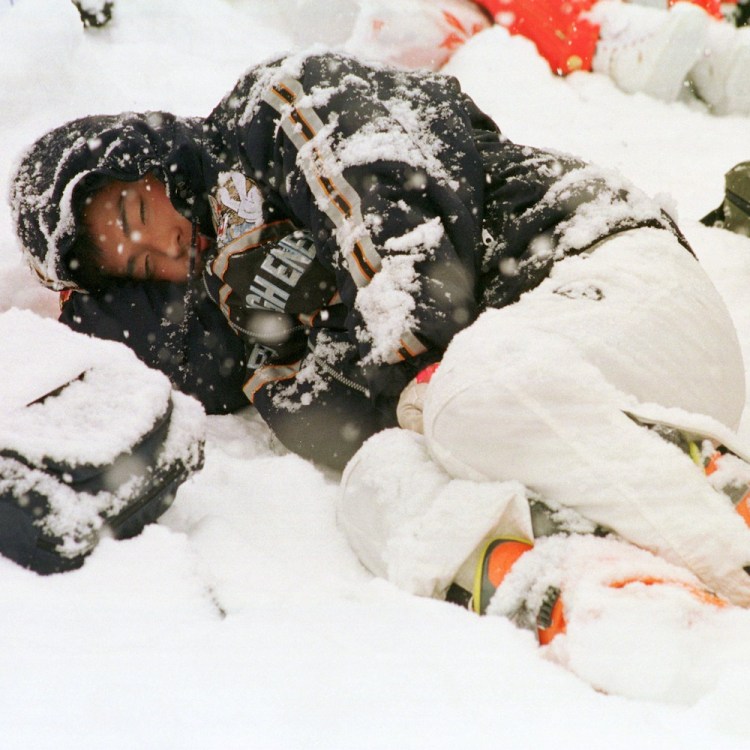During the month of April, we’re publishing a series of interviews, essays, advice columns and reported features about the male friendship crisis in the U.S., a particularly troubling slice of the country’s larger loneliness epidemic. There’s no one-size-fits-all solution, so we’re breaking it down from all angles in The Male Friendship Equation. This is part two of Friends in a Polarized Nation: interviews with men who are reaching across some of the country’s biggest divides.
In an era that seems to be defined by extreme political polarization, where 61% of Republicans and 57% of Democrats say that the agenda of the other party could destroy America as we know it, Bob Osburn and Bruce Pomerantz are outliers.
In the fall of 2022, the same time when those sobering poll results were published by NBC News, Bruce, a 75-year-old from Fridley, Minnesota, attended an event at a local library that brought people of different political affiliations together. If someone spending their free time attempting to connect with those on the opposite end of the red-blue spectrum sounds like a rarity these days, what Bruce admitted during the introduction portion of the meeting was even more surprising.
“At the end, this guy says, ‘I’m a liberal and I don’t know any conservatives,’” recalls Bob, a 73-year-old from the neighboring town of Roseville. “So right away afterward, I went up to Bruce and said, ‘I’m your conservative.’ That was how it started. We hit it off really fast.”
While many Americans have been struggling for years to navigate relationships with friends, family members and coworkers who have different political opinions — ones that frequently escalate to a tenor of life or death — Bob and Bruce stand out, not only because they’ve been able to successfully bridge the Republican-Democrat divide, but because their friendship flourished precisely because of that chasm.
Bob, who still works part-time at a Christian organization he founded, calls himself a “moderate conservative Republican.” Bruce, a retiree and Humanistic Jew, takes a more colorful approach to his political label. “I’m a knee-jerk liberal, with an emphasis on the jerk, because I immediately go to the far-left,” he says, “but then when I start hearing the other side, I start moderating many times. I’m not going to say always.”
Can Different Generations Truly Be Friends?
On social media, age groups have been condensed into antagonistic memes. Here’s how one Gen Zer and Gen Xer are bridging a widening generation gap.Bob introduced himself to Bruce at a meeting organized by Braver Angels, a nationwide initiative seeking to move away from rancorous partisanship to respectful political dialogue through volunteer-led community events. Both men are still involved in the group in various ways, but they immediately started meeting up on their own, and have been doing so about every month for the last year and a half. Their neutral ground? A nearby Caribou Coffee shop.
During our phone conversation, one of the reasons these septuagenarians hit it off is immediately clear: they share a sense of humor, even about politics, something that seems to be lacking in the national discourse, at least among people of different parties. When asked about why he got involved with Braver Angels, Bruce, an avid cyclist, tells a story about his misadventures in trying to cross the aisle when he joined a group that repairs bicycles and donates them to people who can’t afford them.
“[The group] was founded by these church members, they all happen to go to the same church,” he says. “So when I joined them, I said, oh good, I’ll meet some conservatives. Well, they’re all Lutherans!” At this point in the story, which feels like a punchline stolen from A Prairie Home Companion, both Bruce and Bob burst out laughing. “So you know,” Bruce adds, “we were all in agreement on everything.”
While these two are quick to laugh at each other’s yarns, they’re not quick to agree on the political controversies of our time. Far from it. Bruce, who voted for Joe Biden in 2020 and is planning to do so again in November, sees Trump as an existential threat. “I’m worried about what would happen to our democracy if Trump gets in again, seriously,” he says.
Meanwhile, Bob says he is not a pro-Trump Republican, though he did vote for him in 2020 under specific circumstances. “I have some Black friends who are very pro-life and they begged me to vote for him and I said, look, I’ll vote for him for only one reason, to show solidarity with you,” Bob, who is also “very strongly pro-life,” explains. In the upcoming presidential election, he says he will not vote for Trump or Biden, “and perhaps not for any presidential candidate.”
I discover that I usually can learn something from someone, like Bruce, who disagrees with me politically. I genuinely learn something and I find it very valuable.
Bob Osburn
Instead of tiptoeing around tough issues, like abortion, that they’re passionate about — a tactic many Americans have leaned on heavily — the friends take the opposite tack entirely.
“We don’t have any topics that are verboten,” says Bruce. That said, if the issue is sensitive and they feel they aren’t having productive discussions, they’ll agree to move on once they learn the other’s position. “We don’t return and keep haggling over the same thing, because we know where we stand.” But if there’s a new debate that arises in courts, political chambers or news outlets, then they’re more than happy to open things up again.
“In fact, I know the next [topic]. When we meet next month, it’s going be about IVF, because I want to know what he thinks about whether or not you’re destroying life or not, if you have those frozen eggs there,” says Bruce. “That’s what I’m going to get him on.”
If that sounds antagonistic, Bruce doesn’t mean it that way, and Bob doesn’t receive it that way. Part of the ease they feel seems to come from their months of friendship, some from a shared desire to understand their political opponents, but also, crucially, part of it comes from the fact that they consciously decided to not view each other as “political opponents.”
“I would like to use a different term, because Bob used the term ‘We’re different politically,’” Bruce says in response to his conservative companion. “I think ‘philosophically’ would be a better term, because when you say ‘politically,’ you’re thinking left, right, Republican, Democrat.” Instead of defining each other by their politics, they try to see each other through the broader lens of life experience, which includes their different religions as well as family, education and other attributes, which also happen to diverge significantly. Bob is a married father of four with 12 grandchildren, while Bruce is, as he puts it, “an unintentional lifelong bachelor.”
In fairness, this may be a sentiment people have heard before: to try and see people of other political parties not as adversaries, but as human beings with unique life circumstances completely apart from your own. Still, it can seem nearly impossible for both Republicans and Democrats to see beyond the labels, especially when fraught topics like abortion, guns, immigration, the Israel-Hamas war and LGBTQ rights are top of mind. But Bob and Bruce’s secret to forging their friendship actually has less to do with how they see each other than how they personally approach their political discussions.
“I’m aware that there are certainly people on both sides that have this desperate need to convince other people that they’re right,” says Bob. “And I’m sympathetic to that because there are times when I’m with myself or my wife, I’ll say, I realize I’ve become that kind of person.” But through both his Christian worldview and a conscious effort to empathize with other people, he got to a point where he was able to let go of the need to persuade. Instead, Bob now goes into political conversations with a different end goal.
“I discover that I usually can learn something from someone, like Bruce, who disagrees with me politically. I genuinely learn something and I find it very valuable,” he says. “And I think, at least based on Bruce’s response, I think he would say he does too. So I just don’t have to win an argument. I just don’t need to.”
Bruce has had the same realization and pivot in his own thinking.
“At this first [Braver Angels] session — and Bob will remember this, I’m sure — I had a hard time because they were trying to teach me simply to acknowledge my own biases,” says Bruce. “And I kept thinking, well, how do I convince the other guy to think my way? So I had to learn that lesson, finally.”
After he switched his objective from winning to understanding, Bruce finally got what he wanted back in the fall of 2022: a conservative friend. He and Bob even ended up spending Thanksgiving together that year. (The only reason they didn’t repeat the holiday get-together in 2023 is because of other family obligations.)
As for advice they’d give to other Americans interested in mending fences with their politically-opposed family and friends, or for those who are daring enough to seek out new relationships across the partisan breach, Bruce says, “As long as we see each other as enemies, there is not going to be any middle ground to agree on. We’ve got to realize, no, you’re a human being. You’ve got this position. I will try as much as possible to understand where you are, but I want you to also understand where I’m coming from.”
If you take that leap, you may come out emotionally bruised on the other end. On the other hand, you may also, like Bob and Bruce, come out with a rosier view of America, and maybe even a new friend.
“In this relationship, I discovered Bruce — as a representative of many people who think like him — has the same desires for a healthy, strong America that I do,” says Bob. “And wow, that’s wonderful.”
The Charge will help you move better, think clearer and stay in the game longer. Subscribe to our wellness newsletter today.
